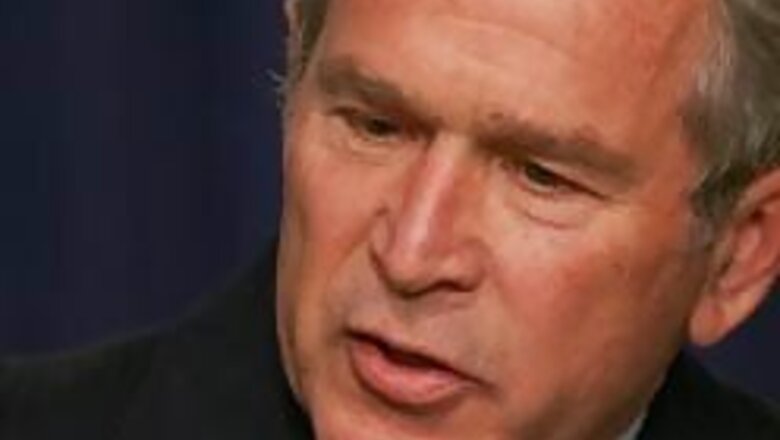
views
United Nations: US President George W Bush on Tuesday appealed directly to Muslims to assure them that the United States is not waging war with Islam as he laid out a vision for peace in the Middle East before world leaders at the United Nations.
On the sidelines, Bush pressed Iran to return at once to international talks on its nuclear program and threatened consequences if they do not.
But his speech to the United Nations General Assembly was less confrontational and aimed at building bridges with people in the Middle East angry with the United States.
“My country desires peace,” Bush told world leaders. ''Extremists in your midst spread propaganda claiming that the West is engaged in a war against Islam. This propaganda is false and its purpose is to confuse you and justify acts of terror. We respect Islam.''
Addressing Iraqis specifically, Bush said, "We will not abandon you in your struggle to build a free nation."
Bush said Iran “must abandon its nuclear weapons ambitions.'' Iranian President Mahmoud Ahmadinejad was scheduled to speak to the body later on Tuesday, but he was not at the country's table in the hall when Bush spoke.
Speaking to Iranians, Bush said their country's future has been clouded because “your rulers have chosen to deny you liberty and to use your nation's resources to fund terrorism and fuel extremism and pursue nuclear weapons.”
On the crisis in Sudan's violence-wracked region of Darfur, Bush delivered strong warnings to both the United Nations and the Sudanese government, saying that both must act now to avert a further humanitarian crisis.
Bush said that if the Sudanese government does not withdraw its rejection of a U.N. peacekeeping force for Darfur, the world body should act over the government's objections. The U.N. Security Council last month passed a resolution that would give the U.N. control over the peacekeeping mission in Darfur, now run mostly ineffectively by the African Union. But Sudan has refused to give its consent.
PAGE_BREAK
''The regime in Khartoum is stopping the deployment of this force,'' Bush said. ''If the Sudanese government does not approve this peacekeeping force quickly, the United Nations must act.''
With more than 200,000 people already killed in three years of fighting in Darfur and the violence threatening to increase again, Bush said the ''credibility of the United Nations is at stake.''
Iran's defiant pursuit of a nuclear program was at the top of the agenda when Bush met earlier with French President Jacques Chirac at the Waldorf Astoria hotel. The French leader is balking at the US drive to sanction Iran for defying Security Council demands that it freeze uranium enrichment.
''Should they continue to stall,'' Bush said of Iranian leaders, ''we will then discuss the consequences of their stalling.'' The president, speaking after his meeting with Chirac, said those consequences would include the possibility of sanctions.
Bush said that Iran must first suspend uranium enrichment ''in which case the U.S. will come to the table.''
But he also stressed that he and Chirac ''share the same objective and we're going to continue to strategize together.''
Bush's speech was the last in a series on the war on terror, timed to surround last week's fifth anniversary of the Sept. 11 attacks and to set the tone for the final weeks of the U.S. midterm elections when control of both houses of Congress is at stake.
Bush was speaking in the same room where four years and one week ago he made another plea for action in the Middle East. On that day, Bush said Saddam Hussein had stockpiles of deadly chemical and biological agents that the United Nations must confront.
PAGE_BREAK
He was wrong, but still forged ahead with war against Iraq without the support of many other nations. And he is still trying to rebuild credibility with the world body, experts say.
''The sense outside of the U.S. is that the United States is responsible for many of the failures in Iraq, first by going in mostly alone and then by incompetent administration,'' said Jon Alterman, a Mideast expert at the Center for Strategic and International Studies in Washington.
''The problem with the way he's talked about democracy in the Middle East is not that people see it as undesirable,'' Alterman said, ''it's that people see it as naive. He needs to persuade cynical people that not only is he sincere, but it's achievable, and here's what they need to do to make it so.''



















Comments
0 comment